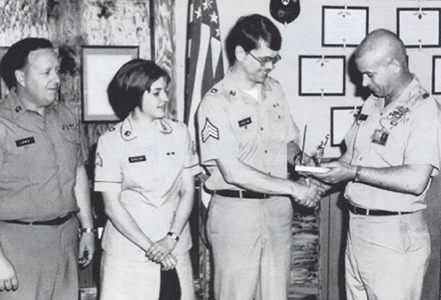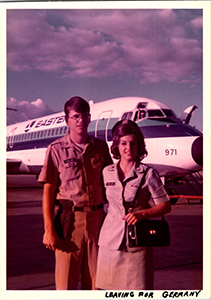Army Vietnam War La Grange, IL Flight date: 09/25/24
By Wendy L. Ellis, Honor Flight Chicago Veteran Interview Volunteer
When Laurel and Craig Schilling walked down the aisle in May of 1972, they had no idea their plan to return to college safely ensconced in married student housing was never meant to be. Instead, the newly married couple embarked on a journey that took them halfway around the world and earned them the dubious distinction of being the first married couple in Illinois, and only the second nationwide, to enlist in the U.S. Army together.
Laurel and Craig met on a blind date at the university of Iowa in Laurel’s freshman year and Craig’s junior. Though both hailed from LaGrange, they had never met while in High School. Two years later, they decided to marry, and as fate would have it, Craig found himself a few credits short of graduation, so they planned to return to the University of Iowa so he could finish, and Laurel could continue her education.
But the U.S. Army had other ideas. In August, 3 months after they married, Craig got a draft notice and they knew it meant they would soon be separated for months if not years, something neither of them wanted. They put their heads together and decided they would enlist together before Craig could be drafted.
“I was thinking it would be kind of an interesting thing to do,” says Laurel. “No females had ever done that. I thought that would be kind of a unique experience.” But it wasn’t just unique, it was a first. No married couple had ever enlisted together before in Illinois and it caused some confusion at the recruitment office.
“They just had no clue,” says Craig. “Normally when you enlist you get your choice of station and MOS to start with. They had no clue how to do that. And when they tried to enlist her, they found out the law said if she wasn’t 21, she had to have her parents’ permission. And it didn’t matter if she was married. That was just the way it was back then.”
Laurel enlisted in the Women’s Army Corp and was sent to Basic training at Fort McClellan in Alabama. Craig went to Basic at Fort Polk, Louisiana, but they reunited for Advanced Individual Training at Fort Gordon, Georgia.
“Basic training in the Women’s Army Corp was very ladylike. We spent a lot of time ironing, I do remember that,” says Laurel. “At the time they had shirts with a little black edging that was really hard to iron. And the week that we had field training, because we had to go out in the forest at night, and the bombs were going off, and the girls were just screaming. And I remember thinking, we’re not really ready for combat.




The pair had one more hiccup to overcome before being shipped overseas. When AIT was over their orders didn’t match. Craig was assigned to the 232nd Signal Corp at Worms Telecommunications Center in Worms, Germany. But Laurel’s orders were general in nature, which meant she could have been sent anywhere. That was not what the couple had signed up for. So Craig wrote a personal letter to then Congressman Ed Derwinski of Illinois, whose influence eventually got Laurel reassigned to Worms as well.
“I remember when we flew over there, they didn’t know what to do with us,” says Laurel. “I remember we didn’t eat for like two days. We had no money. I think we had $5. We bought a sandwich in a vending machine. And when we got there, they had us stay with some couple in their apartment, and they didn’t know what to do with us either.” At Fort Gordon they had lived in a 50-foot trailer off campus and had walked the 3 and a half miles to and from every day. In Worms, they ended up living in Hamm, Germany, about 8 miles from the base and since they had no car for the first couple years they lived there, the duo rode their bikes to and from Taukkunen Barracks, headquarters of Tascom Europe. Despite the distance, the two settled into their duties as communications center specialists with the 232nd Signal Company.
Craig was secretary to the Warrant Officer there and later became the Comtech, in charge of all the top-secret documents. His promotions came quickly and by the last of his 5 years at Worms, he was NCOIC of the communications center. He was named Soldier of the Year for the 5th Signal Command Europe. Laurel served for three years and was given the job of the methods and results clerk. She reviewed all the days traffic and analyzed for errors. “When you type on a teletype it comes out on a ribbon, so you have to be really accurate because you can’t go back and correct anything,” says Laurel. Both attained the rank of Sergeant before leaving the service.
There was only one time during their years in Germany that they felt in any danger. In 1976 the Baader–Meinhof gang, considered a terrorist group in Germany, blew up the Frankfort Communications center, not far from Worms.
“I still remember we were in the car on our way in, and they had set up road blocks,” said Craig. “Everyone got stopped and they put Uzis in the window while they checked the car. We were told to check our cars before we came in for awhile.”
One big advantage to their assignment was the ability to finish their college degrees through an overseas program through Boston University. They also achieved their Master’s degrees, and when Craig returned to the U.S. He used the GI bill to get his Doctorate. Over the years Laurel has worked as a secretary and librarian while raising their four children. Craig has been active in School Business administration, and is currently a professor at Concordia University. But neither regrets the years they spent in service to their country.
“The one thing that’s kind of interesting for our age group is it’s not unusual for people to have served,” says Laurel. “We served, his brother served, my brother-in-law served. It’s pretty common. Nowadays, because it’s an all-volunteer military, you don’t really run into people with military experience, not as much as you used to. In a way I feel that’s kind of a shame.”
Laurel says she really didn’t enjoy being in the Army as much as Craig, but over the years it’s grown on her. “Overall as the years have gone on, I appreciate it a lot more. Because when you are a woman and you say you served, there aren’t that many. At my granddaughter’s graduation they asked the veterans to stand up so I stood up. People were looking at me, like “What”? But I like being acknowledged in that way.”
“We didn’t know after we went in what would happen after the first tour,” says Craig. “We picked signal corp for 3 years. If I’d gotten drafted I’d have been in for two years. In retrospect, if I’d gotten drafted, I probably wouldn’t have served more than 4 or 5 months. Because the war ended in 75. They took a lot of the draftees and said, “Go home.”
I can tell you one thing though. The sort of thing that was true of anybody in the military at that time. Nobody liked the military. That was kind of not a nice thing.”
For Craig and Laurel Schilling, and all other other Vietnam era veterans, Honor Flight Chicago is our way of saying thank you for your service.


